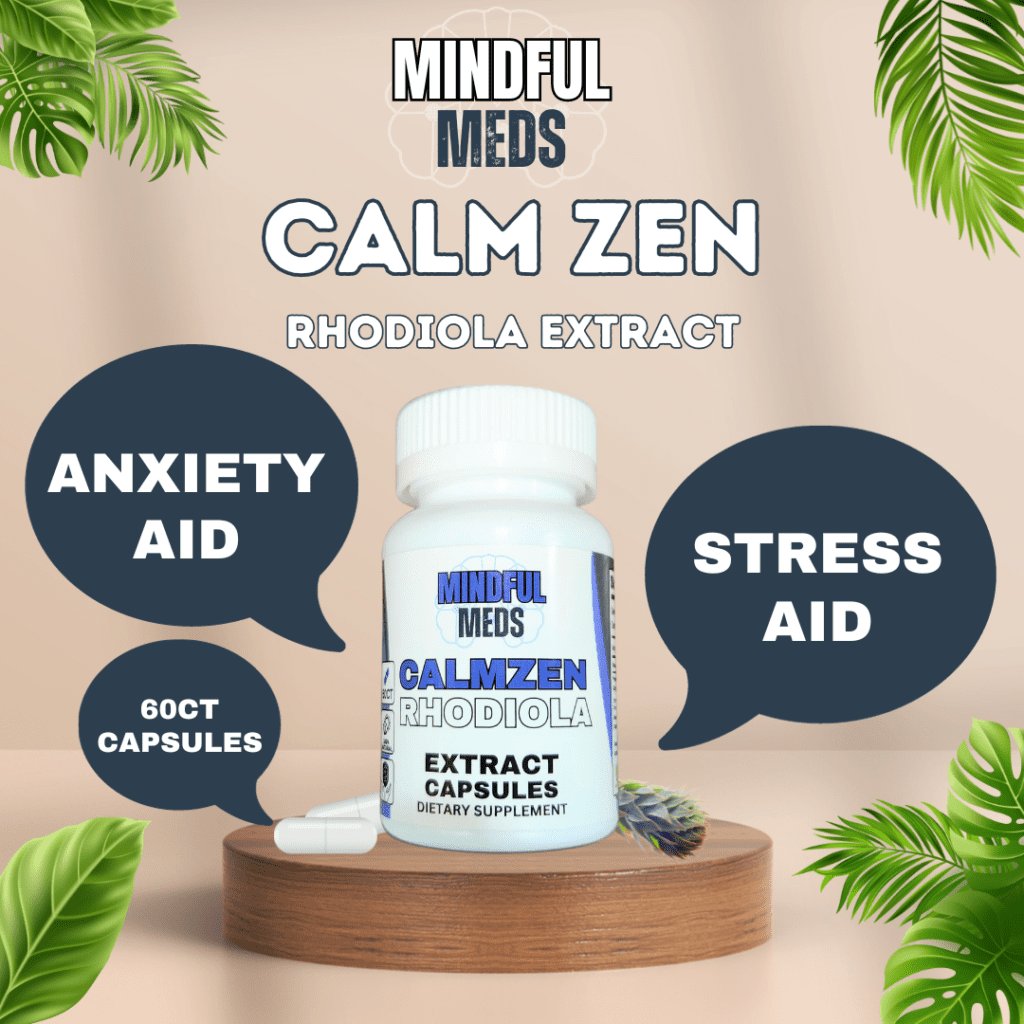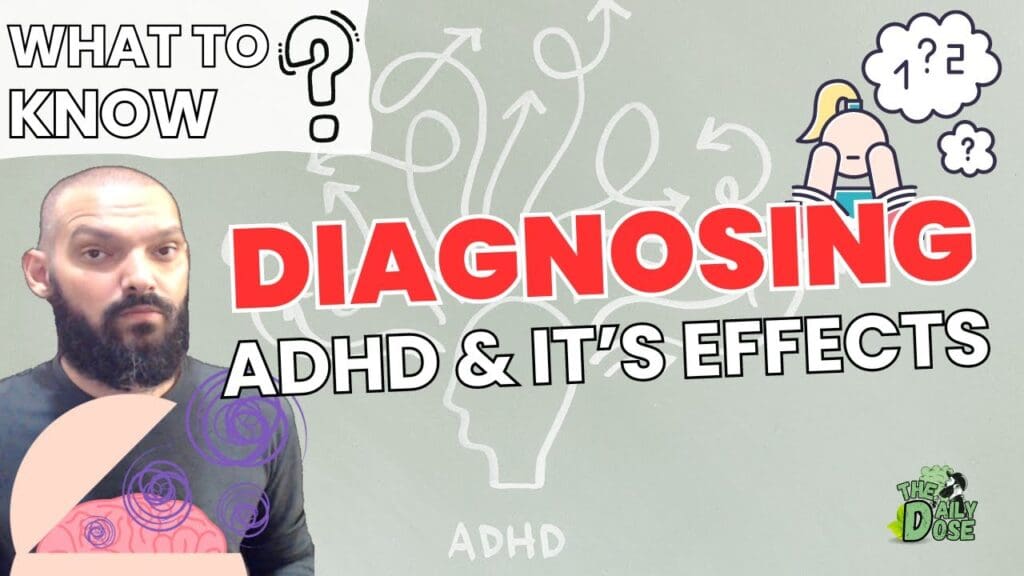Listen to the short audio clip here: The Daily Dose Podcast
Self Diagnosing ADHD The Truth
Common Behaviors Of ADHD
- missing details
- careless mistakes
- difficulty staying focused during long-format events, like lectures
- absent listening
- distractibility
- poor time management
- lack of organization
- misplacing important items
- forgetfulness
- fidgeting
- restlessness
- movement inappropriate to a situation, like leaving your seat during class
- excessive talking
- blurting out responses
- impatience
- interrupting
- excessive drive to be moving
1. Introduction
Understanding Attention Deficit Hyperactivity Disorder (ADHD) is crucial for individuals experiencing challenges related to focus and energy. While recognizing symptoms is a key step, self-diagnosing ADHD is not a viable option. This article explores the intricacies of ADHD, its prevalence, the reasons behind the necessity for professional diagnosis, the diagnostic process, and steps to take if you suspect you have ADHD.

2. The Prevalence of ADHD
ADHD is a prevalent neurodevelopmental disorder affecting both children and adults. In the United States alone, approximately 6 million children aged 3–17 years grapple with ADHD. Typically diagnosed during childhood, this condition poses unique challenges that extend into adulthood. Understanding the prevalence of ADHD sets the stage for a deeper exploration of its complexities.
3. Can ADHD be Self-Diagnosed?
The Importance of Professional Diagnosis
The question of whether ADHD can be self-diagnosed is a common one. The short answer is no. Seeking a formal diagnosis from a qualified medical professional is essential. Various healthcare professionals, including primary care physicians, pediatricians, neurologists, psychologists, and psychiatrists, possess the expertise required for accurate ADHD diagnosis. The importance of a professional diagnosis lies in the subsequent treatment planning and support services.
Overlapping Symptoms with Other Disorders
ADHD symptoms are not exclusive, and they can overlap with those of other disorders. Trained professionals, equipped with in-depth knowledge of the complex neurological underpinnings of ADHD, can distinguish it from conditions like sensory processing disorder (SPD). SPD shares some symptoms with ADHD, such as restlessness or hyperactivity, making it crucial to rely on the expertise of healthcare professionals for accurate differentiation.
Challenges of Objectivity
Attempting to self-diagnose ADHD introduces the risk of bias and misinterpretation. Individuals may unintentionally magnify certain behaviors due to personal experiences, preconceived notions, or familial influences. For instance, having a relative with ADHD may heighten awareness of certain behaviors, leading to an overemphasis on their significance. Objectivity is challenging when assessing one’s own symptoms, highlighting the necessity of professional evaluation.

4. The Diagnostic Process for ADHD
Criteria in the DSM-5-TR
Formal diagnosis of ADHD relies on specific criteria outlined in the Diagnostic and Statistical Manual of Mental Disorders, 5th edition, text revision (DSM-5-TR). The DSM-5-TR criteria involve the presence of six or more symptoms of hyperactivity and impulsivity and/or inattention for at least 6 months, not consistent with expected development in children. In adults, a diagnosis requires five symptoms, emphasizing the importance of standardized criteria.
Differentiating Symptoms in Children and Adults
Children and adults may exhibit different ADHD symptoms. Professionals consider the age-specific criteria and evaluate the impact on daily life. For adult diagnosis, evidence of several formal symptoms before the age of 12 is required. This nuanced approach ensures that ADHD is accurately identified across different life stages.
Comprehensive Evaluation
During the evaluation, healthcare professionals delve into the patient’s daily life, challenges, and specific symptoms. Understanding how ADHD affects crucial areas such as interpersonal relationships, work, or school is essential for an accurate diagnosis. This comprehensive approach allows professionals to gather information beyond mere symptomatology.
Additional Testing and Consultations
In some cases, additional testing or consultations with specialists may be necessary to rule out other possible conditions. This ensures a thorough examination of all potential contributing factors to the observed symptoms, providing a more accurate and comprehensive diagnosis.

5. Recognizing ADHD Symptoms
Common Experiences
While an official self-diagnosis is not possible, individuals can still recognize common symptoms associated with ADHD. These may include ongoing patterns of missing details, careless mistakes, distractibility, poor time management, and restlessness. However, it is crucial to understand that multiple symptoms must be present over a significant period, impairing daily life, for a formal diagnosis.
Variability in Symptoms
ADHD manifests uniquely in each individual. Excessive restlessness or talkativeness alone does not necessarily indicate ADHD. A formal diagnosis requires a careful consideration of multiple symptoms and their impact on daily functioning. Understanding the variability in symptoms is essential for accurate self-awareness.

6. Seeking Professional Help
Primary Care Physicians
If you suspect you have undiagnosed ADHD, the first step is to consult with a primary care doctor. These healthcare professionals can initiate the evaluation process and guide you toward specialized diagnosis and treatment.
Specialists for ADHD Diagnosis
In addition to primary care physicians, specialists such as pediatricians, neurologists, psychologists, and psychiatrists play crucial roles in ADHD diagnosis. Their expertise ensures a thorough evaluation, accurate diagnosis, and appropriate treatment planning.
If you don’t currently have a primary doctor, you can find healthcare services in your area by contacting:
- Substance Abuse and Mental Health Services Administration (SAMHSA) National Helpline: 800-662-4357
- FindTreatment.gov
- CMS.gov

7. The Use And Effects Of Ritalin On Young Children
I have expressed concerns about this for years, young children being exposed to brain chemistry altering substances at a young age can not be the answer to this problem. If a child is acting up or seems to have other interests than doing what they are told it doesn’t mean something is wrong with them.
Kids will be kids and often times these behaviors improve if you remain vigilant about disciplining appropriately and being patient. That is what parenting requires mostly patience with your child. There has been extensive research on the short term benefits of Ritalin use for young children, however concerns have been raised about long term use.
Long-term use of Ritalin, a commonly prescribed medication for children with Attention Deficit Hyperactivity Disorder (ADHD), has been subject to extensive research, providing insights into its effects on young individuals over time.
Numerous studies have indicated that Ritalin, also known as methylphenidate, can lead to significant improvements in ADHD symptoms, including enhanced focus and reduced impulsivity. However, it is crucial to note that the long-term impact of Ritalin on young children is a complex subject, with both positive and potential adverse effects.
On the positive side, research has demonstrated that sustained use of Ritalin is associated with improved academic performance and social functioning in children diagnosed with ADHD. The medication has proven effective in managing core ADHD symptoms, facilitating better classroom engagement and interpersonal relationships.
Nonetheless, concerns have been raised about potential side effects such as insomnia, loss of appetite, and, in some cases, slowed growth. While the short-term benefits are well-documented, ongoing studies aim to delve further into the nuanced effects of prolonged Ritalin use, emphasizing the importance of careful monitoring and personalized treatment plans for young individuals with ADHD.

8. Conclusion: The Imperative of Professional Evaluation
While recognizing ADHD symptoms is a valuable first step, the formal diagnosis of ADHD requires the expertise of trained healthcare professionals. The complexities of ADHD, overlapping symptoms with other disorders, and the inherent subjectivity of self-assessment underscore the importance of seeking professional evaluation. A comprehensive diagnosis lays the foundation for effective treatment and support tailored to individual needs.
Statistics Data Provided By Statista
FAQs
Can I self-diagnose ADHD?
Who can diagnose ADHD?
Why is professional diagnosis important?
Can ADHD symptoms change over time?
What should I do if I suspect I have ADHD?
Related Articles:
- St. John’s Wort Benefits And Risks Explained
- Diabetes And Mental Health The Connections
- Guide to Cardiovascular Health: Statins
- Kava For Anxiety Alcohols Replacement Now
Meet The Author





